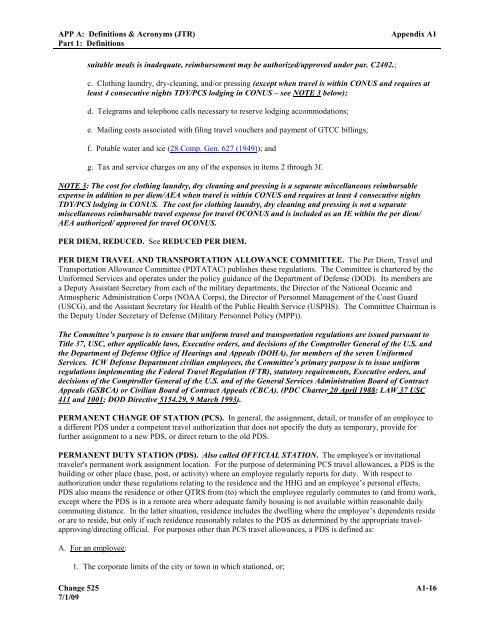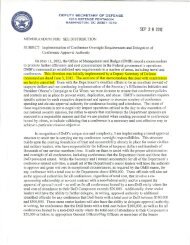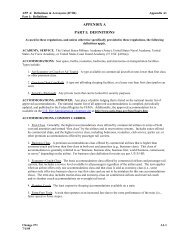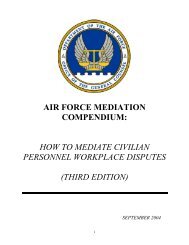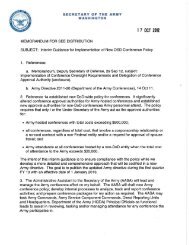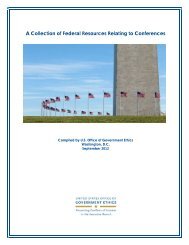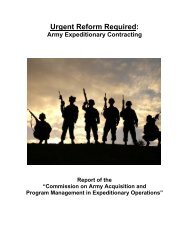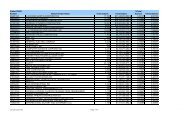THE JOINT TRAVEL REGULATIONS - Office of the General Counsel
THE JOINT TRAVEL REGULATIONS - Office of the General Counsel
THE JOINT TRAVEL REGULATIONS - Office of the General Counsel
You also want an ePaper? Increase the reach of your titles
YUMPU automatically turns print PDFs into web optimized ePapers that Google loves.
APP A: Definitions & Acronyms (JTR)<br />
Part 1: Definitions<br />
suitable meals is inadequate, reimbursement may be authorized/approved under par. C2402.;<br />
Appendix A1<br />
c. Clothing laundry, dry-cleaning, and/or pressing (except when travel is within CONUS and requires at<br />
least 4 consecutive nights TDY/PCS lodging in CONUS – see NOTE 3 below);<br />
d. Telegrams and telephone calls necessary to reserve lodging accommodations;<br />
e. Mailing costs associated with filing travel vouchers and payment <strong>of</strong> GTCC billings;<br />
f. Potable water and ice ( 28 Comp. Gen. 627 (1949)); and<br />
g. Tax and service charges on any <strong>of</strong> <strong>the</strong> expenses in items 2 through 3f.<br />
NOTE 3:<br />
The cost for clothing laundry, dry cleaning and pressing is a separate miscellaneous reimbursable<br />
expense in addition to per diem/AEA when travel is within CONUS and requires at least 4 consecutive nights<br />
TDY/PCS lodging in CONUS. The cost for clothing laundry, dry cleaning and pressing is not a separate<br />
miscellaneous reimbursable travel expense for travel OCONUS and is included as an IE within <strong>the</strong> per diem/<br />
AEA authorized/ approved for travel OCONUS.<br />
PER DIEM, REDUCED. See REDUCED PER DIEM.<br />
PER DIEM <strong>TRAVEL</strong> AND TRANSPORTATION ALLOWANCE COMMITTEE. The Per Diem, Travel and<br />
Transportation Allowance Committee (PDTATAC) publishes <strong>the</strong>se regulations. The Committee is chartered by <strong>the</strong><br />
Uniformed Services and operates under <strong>the</strong> policy guidance <strong>of</strong> <strong>the</strong> Department <strong>of</strong> Defense (DOD). Its members are<br />
a Deputy Assistant Secretary from each <strong>of</strong> <strong>the</strong> military departments, <strong>the</strong> Director <strong>of</strong> <strong>the</strong> National Oceanic and<br />
Atmospheric Administration Corps (NOAA Corps), <strong>the</strong> Director <strong>of</strong> Personnel Management <strong>of</strong> <strong>the</strong> Coast Guard<br />
(USCG), and <strong>the</strong> Assistant Secretary for Health <strong>of</strong> <strong>the</strong> Public Health Service (USPHS). The Committee Chairman is<br />
<strong>the</strong> Deputy Under Secretary <strong>of</strong> Defense (Military Personnel Policy (MPP)).<br />
The Committee’s purpose is to ensure that uniform travel and transportation regulations are issued pursuant to<br />
Title 37, USC, o<strong>the</strong>r applicable laws, Executive orders, and decisions <strong>of</strong> <strong>the</strong> Comptroller <strong>General</strong> <strong>of</strong> <strong>the</strong> U.S. and<br />
<strong>the</strong> Department <strong>of</strong> Defense <strong>Office</strong> <strong>of</strong> Hearings and Appeals (DOHA), for members <strong>of</strong> <strong>the</strong> seven Uniformed<br />
Services. ICW Defense Department civilian employees, <strong>the</strong> Committee’s primary purpose is to issue uniform<br />
regulations implementing <strong>the</strong> Federal Travel Regulation (FTR), statutory requirements, Executive orders, and<br />
decisions <strong>of</strong> <strong>the</strong> Comptroller <strong>General</strong> <strong>of</strong> <strong>the</strong> U.S. and <strong>of</strong> <strong>the</strong> <strong>General</strong> Services Administration Board <strong>of</strong> Contract<br />
Appeals (GSBCA) or Civilian Board <strong>of</strong> Contract Appeals (CBCA). (PDC Charter 20 April 1988; LAW 37 USC<br />
411 and 1001; DOD Directive 5154.29, 9 March 1993).<br />
PERMANENT CHANGE OF STATION (PCS). In general, <strong>the</strong> assignment, detail, or transfer <strong>of</strong> an employee to<br />
a different PDS under a competent travel authorization that does not specify <strong>the</strong> duty as temporary, provide for<br />
fur<strong>the</strong>r assignment to a new PDS, or direct return to <strong>the</strong> old PDS.<br />
PERMANENT DUTY STATION (PDS). Also called OFFICIAL STATION. The employee's or invitational<br />
traveler's permanent work assignment location. For <strong>the</strong> purpose <strong>of</strong> determining PCS travel allowances, a PDS is <strong>the</strong><br />
building or o<strong>the</strong>r place (base, post, or activity) where an employee regularly reports for duty. With respect to<br />
authorization under <strong>the</strong>se regulations relating to <strong>the</strong> residence and <strong>the</strong> HHG and an employee’s personal effects,<br />
PDS also means <strong>the</strong> residence or o<strong>the</strong>r QTRS from (to) which <strong>the</strong> employee regularly commutes to (and from) work,<br />
except where <strong>the</strong> PDS is in a remote area where adequate family housing is not available within reasonable daily<br />
commuting distance. In <strong>the</strong> latter situation, residence includes <strong>the</strong> dwelling where <strong>the</strong> employee’s dependents reside<br />
or are to reside, but only if such residence reasonably relates to <strong>the</strong> PDS as determined by <strong>the</strong> appropriate travelapproving/directing<br />
<strong>of</strong>ficial. For purposes o<strong>the</strong>r than PCS travel allowances, a PDS is defined as:<br />
A. For an employee:<br />
1. The corporate limits <strong>of</strong> <strong>the</strong> city or town in which stationed, or;<br />
Change 525 A1-16<br />
7/1/09


